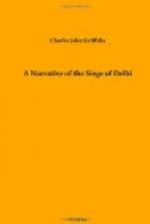There was not a single white regiment stationed at Delhi, not even a European guard, the charge of the arsenal, the largest in Upper India, being entrusted to a few officers and sergeants of artillery. The same may be said of Phillour, in the Punjab—a small station, where only native troops were quartered. The fort of Ferozepore, near the left bank of the Sutlej River, was guarded by 100 men detailed from the sepoy regiments at that cantonment, and, with Phillour, constituted the only places from which ammunition could be drawn for the large force, European and native, guarding the newly-acquired province of the Punjab.
Her Majesty’s 61st Regiment of Foot was stationed at Ferozepore in May, 1857. In that corps I held a commission as Lieutenant, and, during the absence of my Captain on leave in Kashmir, was in temporary command of the Grenadier Company.
The regiment at this time mustered nearly 1,000 men, half that number old and gallant veterans of from ten to twenty years’ service. These had fought in many Indian campaigns, and on the terrible day of Chillianwalla, in January, 1849, when the Khalsa army rolled back in utter defeat a portion of Lord Gough’s force, had, under the leadership of Sir Colin Campbell, altered the fortunes of the battle. Advancing in line under a tremendous cannonade, and without firing a shot, they marched as if on parade and in stern silence till within fifty yards of the Sikh batteries, when, with a shout which struck terror into the breasts of their enemies, they charged irresistibly and took the guns.
It was to men such as these that, fortunately for the maintenance of our Empire in the East, England trusted in the perilous days of 1857. As of my own regiment, so it may be said of all then quartered in India—sturdy, fine fellows, of good physique, of rare discipline, and inured to the climate, who, in the words of the Iron Duke, could march anywhere and fight anything. The army then had not been improved out of existence; reforms, if such they can be called, were received with considerable disfavour; for what amelioration could be effected in the discipline and steady courage of those who had stormed the heights of the Alma, had stood the shock of the Muscovite at Inkerman, and had not despaired on the bloody fields of Ferozeshah and Chillianwalla?
I may be excused if I thus energetically offer my tribute of praise to that army, and more especially to that regiment in which I passed my young days. I recall the numberless acts of devotion and courage, the tender solicitude with which the veterans of the Grenadier Company looked after the safety of their youthful commander, during the campaigns of 1857; and my pen falters and my eyes grow dim with tears as memory brings before me my gallant comrades in the ranks who fell before Delhi, or lost their lives through disease and exposure.
I had been absent from my regiment during the whole of 1856, doing duty at the Murree Convalescent Depot, and rejoined in March of the following year. Nothing occurred for the next two months to break the monotony of life in an Indian cantonment. Parade in the early morning, rackets and billiards during the day, a drive or ride along the Mall in the cool of the evening, and the usual mess dinner—these constituted the routine of our uneventful existence.




